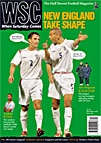 Zagreb was a debacle for Steve McClaren on and off the pitch, with echoes of the worst of his predecessors and, as Jonathan Wilson reports, a faux pas that wound up the locals
Zagreb was a debacle for Steve McClaren on and off the pitch, with echoes of the worst of his predecessors and, as Jonathan Wilson reports, a faux pas that wound up the locals
It wasn’t just the on-field tactics that Steve McClaren got badly wrong in Zagreb. For a man supposedly so media savvy, his decision to conduct his post-match press conference solely in English (with a “summary” in Croatian at the end; little use for any non-English-speaking member of the Croatian media who might have wished to ask a question) was a howler that eclipsed Paul Robinson’s airshot.
It isn’t just that such a refusal to accommodate the opposition is ungracious and arrogant – we, and the world, have come to expect that – but that translation effectively halves the time available for questions. And if there were ever a time when McClaren needed to avoid questions it was immediately after he had been exposed as a bungler capable of Graham-Taylor-in-Oslo proportions. Little wonder Max Clifford ditched him as a hopeless case a few days later.
The Croatian journalists were riled, of course, and those who could speak English needled away. “Mr McClaren,” one asked with exquisite over-politeness, “did Croatia win because they are the better team, or because of your mistakes?” McClaren squirmed, mused a moment, then said: “My mistakes.” No mention of Croatia playing well, no magnanimity in defeat, just the typical arrogance of English football.
The contrast with Slaven Bilic could hardly have been more defined. The Croatia coach acceded to the local media’s retaliatory demand to conduct his press conference only in Croatian, but afterwards stood to one side and chatted happily to English journalists. The cynical may say he is angling for a job in England (although certainly not before Euro 2008), but there was no denying the acuity of his insights. He was delighted to see the opposition play 3‑5‑2, he said, not merely because England’s players, most significantly the full-backs, were not used to it, but also because it was so familiar to his men. Croatia have historically used 3‑5‑2: when played as badly as it was by England, they could pick holes in it in their sleep.
As well as mishandling the press conference, McClaren seemed to have allowed himself to be influenced by the media – and if there is one thing to set the pack baying at the moon, it is the thought that they have influence. After the draw against Macedonia, it was widely – and accurately – reported that he had been tactically outwitted by Srecko Katanec. It was also noted how reminiscent the listlessness of the performance had been of the later days of Sven-Göran Eriksson – an accusation to which, given his undeniable links to the previous regime, McClaren is particularly sensitive.
Thus the decision to switch to 3-5-2 was taken as McClaren suffered a bad case of what in Yes, Minister was known as “Politicians’ logic”: something must be done; this is something; therefore we must do it.
He was desperate to assert his image as tactical master and that clouded his judgment, with all too predictable consequences. It is easy for journalists to be wise after the event – indeed, it is part of the job – but as Kevin McCarra noted in the Guardian, he had never known such pre-match pessimism about England’s chances as he heard that night in Zagreb.
Three at the back also served to emphasise McClaren’s difference from his predecessor, for Eriksson has never had any faith in 3-5-2. His earliest successes, at Gothenburg, came using 4‑4‑2 when the sweeper was still the Swedish default. That reminder that McClaren is not Sven was reinforced by having John Terry patriotically tub-thump before kick-off, an attempt to infuse the dressing room, to use Gareth Southgate’s killing phrase, with the spirit of Winston Churchill rather than Iain Duncan Smith.
Quite apart from representing the pendulum-like nature of English football at its worst – “We need more passion! Give us a ranter and a raver!”; “We need more calm! The players should be allowed to think for themselves!”; “Er, let’s try passion again!” – and so again indicating McClaren’s willingness to dance to the media’s tune, it is hard to know what even Churchill himself could have achieved in the dressing room at the Maksimir. If there is any team on the planet that is not going to be outdone for nationalist machismo, it is Croatia. A favourite chant of their fans, after all, exhorts, “to battle, to battle for your nation”.
But the newspapers said passion, so that’s what McClaren tried to deliver. The newspapers said he had been tactically outwitted, so he tried to come up with a tactical scheme that would prove his cleverness. Focus-group politicians have long been a curse, but McClaren is in danger of becoming a focus-group manager. As events in Zagreb proved, he can focus as hard as he likes on the style, but all that really matters is the substance beneath.
From WSC 238 December 2006. What was happening this month